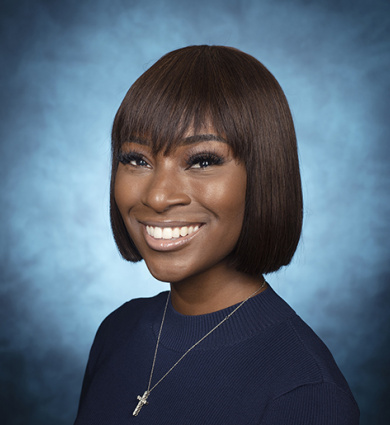

Madeline Walker Miller
I started my business because most people understand the negative impacts that plastic has on the environment, but a lot of people don’t realize what fabric waste is doing to our air, water, and soil resources.
By Lori Atherton
Many people spent the early days of the pandemic learning a new skill or hobby.
Madeline Walker Miller, a new PhD student at SEAS, opted for a different path—starting her own sustainability-focused business in her hometown of Detroit.
Miller is the CEO of NexTiles, a textile recycling company that collects fabric waste from Detroit’s auto manufacturing and fashion industries and converts it into low-dust, eco-friendly building insulation. A blend of recycled cotton and polyester, the insulation—called EcoBlow—is treated with a non-toxic, green coating that meets industry standards for heat resistance, flame retardation, and the ability to repel insects.
“Building insulation is one of the most cost-effective recommendations to reduce heating and cooling bills,” says Miller, who is researching energy justice at SEAS. “In our case, it’s a blown-in insulation that will be used in wall cavities, attic floors, and ceilings.”
Miller’s insulation is now in the product development and testing phase. After completing her first insulation prototype test in Fall 2020, she moved on to ASTM testing this past summer, with the aim of launching her product by the end of the year. She hopes to begin manufacturing EcoBlow in early 2022.
“Our goal is to capture a small percentage of the U.S. green insulation market,” says Miller, whose initial focus is on the Detroit retrofit market. “Sixty percent of the housing stock in Detroit was built before 1970, making it a really great opportunity for insulation upgrades in the residential retrofit space. We’ll focus on the Detroiters who need these insulation upgrades first, then eventually target new builds.”
Miller’s long-term strategy is to sell her sustainable insulation in big-box stores like Home Depot and Lowe’s.
While NexTiles only uses cotton and polyester for its EcoBlow insulation, the company will collect any type of fabric waste—whether it’s wool or pink spandex—and work with its network of business partners to find a secondary use for it. NexTiles employs several textile waste specialists who collect unused fabric from southeast Michigan businesses.
Miller learned about the global environmental problem of textile waste—approximately 80 percent of which ends up in landfills, she says—as a graduate student at the University of Miami Rosenstiel School of Marine and Atmospheric Science. While researching how plastic waste adversely affects oceans, Miller discovered that synthetic materials such as polyester and nylon contain small plastic fibers, or microplastics, that shed from clothing and wind up as ocean pollution. The microplastics are ingested by fish and other seafood that humans eat.
Through an internship at a New York-based textile recycling company called FABSCRAP, Miller saw how unwanted fabric could be recycled and reused for other purposes, including carpet padding and furniture lining. She began envisioning how she could bring a similar sustainability initiative to Detroit.
“I started my business because most people understand the negative impacts that plastic has on the environment,” Miller says, “but a lot of people don’t realize what fabric waste is doing to our air, water, and soil resources.”
Miller, who comes from a “family of entrepreneurs,” turned to her parents and siblings for help in getting NexTiles off the ground. Her mother is Carla Walker-Miller, the founder and CEO of Walker-Miller Energy Services, one of the largest African American and woman-owned energy waste reduction companies in the country.
Miller also completed TechTown Detroit’s Start Studio, a business incubator, which she credits with giving her “the confidence to do the kind of outreach I needed to do in order to get NexTiles moving.” That outreach included spending hours cold-calling 100 potential clients during the customer discovery phase, a nerve-wracking process for the self-described introvert.
Miller’s hard work has paid off, as she now has a devoted clientele. She looks forward to the phone calls and emails she receives from them asking about product updates. “The amount of traction and interest in something that I started a year ago has been awesome to see,” she says.

